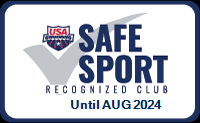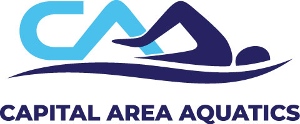Capital Area Aquatics Safe Sport Information

Capital Area Aquatics fully supports and diligently follows the policies established by USA Swimming and the U.S. Center for SafeSport as part of our continued commitment to safeguarding our athletes. Compliance with these policies is a condition of our club's membership and for all members of USA Swimming, including athletes, officials, coaches, and other members such as parents and volunteers.
Last update: 10/13/22
USA Swimming’s top priority continues to be keeping our athletes safe. No form of abuse, including child sexual abuse, has a place in our sport. The policies stem from requirements imposed by the U.S. Center for SafeSport (the “Center”). The Center is the separate, independent organization that oversees all sexual misconduct reports in the Olympic and Para-Olympic movement. The Center is also responsible for creating requirements in the areas of policy, education and training for every National Governing Body (NGB) in the Movement. USA Swimming, as an NGB, must follow the Center’s requirements.
The Center requires every NGB to implement a Minor Athlete Abuse Prevention Policy ("MAAPP") by June 23, 2019. All USA Swimming members and member clubs must implement the Minor Athlete Abuse Prevention Policy version 2.0 ("MAAPP 2.0") by September 1, 2021. This Policy addresses risk areas that present opportunities for abuse to occur.
The Policy covers five areas, which are described in more detail in the linked resources on this page:
- One-on-One Interactions
- Travel: Local & Team
- Social Media & Electronic Communication
- Locker Rooms & Changing Areas
- Massages & Rubdowns
The policies posted on this website are current as of July 24, 2021 and are subject to change based on directives from USA Swimming and the U.S. Center for SafeSport. Please visit the USA Swimming SafeSport site or the USA Swimming MAAPP site for additional information and updates.
All parents (and guardians, if applicable) agree to read, review, and follow all policies listed on this page when they complete the online forms required to register their athlete(s) with our team.
Policies (effective 9/1/21):
- CAA's Minor Athlete Abuse Prevention Policy version 2.0 (effective 9-1-21)
- CAA's Action Plan for addressing bullying
- CAA's Grievance Policies
- CAA's Photography Policies
Documents (effective 9/1/21):
- Parent Code of Conduct
- Athlete Code of Conduct
- Coach Code of Conduct
- Permission for an Unrelated Adult Participant to Provide Local Transportation to a Minor Athlete
- Permission for an Unrelated Adult Participant to Travel to Competition Alone with a Minor Athlete
- Permission for an Unrelated Adult Athlete to Share the Same Hotel, Sleeping Arrangement, or Overnight Lodging Location with a Minor Athlete
- Permission for a Licensed Massage Therapist or Other Certified Professional or Health Care Provider to Treat a Minor Athlete
- MAAPP Acknowledgement of Policy
Other Resources:
- General Requirements
- Safe Sport Best Practice Guidelines
- Personal Assistant Policy
- Definition of "Adult Participant"
- One-on-One Interactions
- Meetings and Individual Training Sessions
- Electronic Communications
- In-program Travel and Lodging
- Locker Rooms and Changing Areas
- Massages and Rubdowns
- Meet 360 guide (policies for swim meets)
How does CAA practice these policies?
- All electronic correspondence (via texts, emails, etc.) and via phone between athletes and adult participants (coaches, officials, adult athlete members, and other USA Swimming members) needs to include a parent or guardian, or another adult participant. This means that when your athlete texts, emails, or otherwise contacts an adult participant, the athlete needs to include the parent or guardian. If an athlete texts or emails a coach or an adult participant, but does not include a parent or guardian, the coach or adult participant will include the parent/guardian on the response.
- In-person meetings between coach and athlete will always meet the "open and observable" requirement, as they always have in the past. For scheduled meetings, such as goal setting sessions, the coach will invite the parent or guardian. If the parent or guardian is unable to attend, the meeting will include another adult participant.
- Correspondence between adult participants and athletes is only permitted from 5am to 9pm, except during team travel or in the event of an emergency, such as an early morning practice cancellation due to severe weather or another unforeseen event.
- CAA coaches will not use group text messages to contact athletes or any other members about practice changes or for any other team communication. Although group text communications are timely, we believe that the protection of your athlete's contact data is extremely important, and limiting opportunities for contact is in everyone's best interests. All communication from our team will be done via email notices sent from our team's website and posted on the "Team Feed" on the CAA home page.
- Our coaches may not use social media to contact athletes, nor will they accept any friend or follower requests from athletes to their personal social media accounts. Athletes may follow and interact with our team's official social media sites on Twitter, Facebook, and Instagram.
- CAA coaches may occasionally instruct athletes from within the water or on the deck to demonstrate and teach stroke technique. Coaches will always explain what they are doing first and ask permission prior to touching an athlete for instruction. Any such instruction will be conducted in accordance with the MAAPP 2.0 policy, which requires the interaction to open and observable to others and not conducted in private. The athlete and his or her parent or legal guardian may refuse or stop such instruction at any time.
- Athletes ages 18 and older are required to take the Athlete Protection Test, because they are "adult participants" under the MAAPP 2.0 policy. Adult athlete members are bound by the same rules that apply to other adult members, such as coaches, except as specified in the MAAPP 2.0 policy.
To report a concern of abuse or bullying:
- CAA's Safe Sport Coordinator
- To deal with a Safe Sport concern, contact USA Swimming at (719) 866-4578
- Anonymous text messages: Any USA Swimming member can now report anonymously, if they wish, through text messaging at 888-270-SWIM (7946).
- Contact the U.S. Center for Safe Sport to make a report. Call 833-5US-SAFE (587-7233) or use the online reporting form or find more information at http://www.uscenterforsafesport.org/




